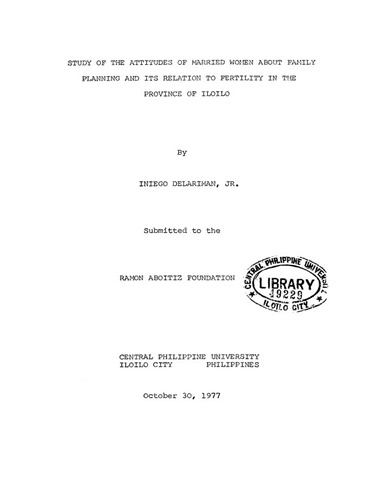| dc.description.abstract | KAP (Knowledge, Attitude, Practice) surveys in developing countries typically show that a majority of women in the childbearing ages say that they want no more children and are interested in methods to prevent pregnancy. Yet, when family planning information and services are made available, only a small minority actually begin to practice contraception within the time-span of a year or two. The gap is substantial-perhaps 70% will express a desire and 20% will act on it, under favorable conditions of exposure to information and motivational campaigns.
As early, in fact, as 1955, Dr. Lee Jay Chow, American Expert on Population, who had been studying the progress of the Malaysian Program said that the rate of population growth ("fertility rate") can be reduced in several ways: raising agency marriage, raising the level of education , and recommending family planning to child-bearing women.
However, there is no shortcut method that will bring about effective changes in family life behavior. Bogue declared that "Until the meaning of high fertility is appreciated and challenged by educational methods in which the individual is left to think his way through the problem, no amount of Indian dancing shows in family planning talks, or other nice entertainment gimmicks, will induce a change in behavior.
One of the psychological variables as possibly affecting fertility are the attitudes of women towards family planning. An attitude, according to Rokeach, is a "relatively enduring organization of beliefs around an object or situation predisposing one to respond in some preferential manner." If it is assumed that birth control behavior is a specific instance of behavioral manifestation of attitudes (in interaction with other psychological variables), it is possible to translate Rokeach's definition into the analysis of birth control behavior. One of the assumptions of this study is that a woman's attitude determine her readiness for and disposition to birth control behavior. In the context of this particular study, however, attitude is taken to mean the opinions or reasons of the married women for avoiding pregnancy, birth control oppositions, opinions concerning the teaching of contraceptive methods in the high school and the general attitudes of these women in limiting the number of children.
Purpose of the Study. The purpose of this study was to secure the opinions or reasons of the married women about family planning in the province of Iloilo. Specifically, it aimed to answer the following questions, namely:
(1) What are the married women's reasons for avoiding pregnancy when they are classified as to the type of community or residence they belong, socio-economic status, educational attainment, and family planning behavior or family planning practice?
(2) What do married women, classified as to residence, socioeconomic status, educational attainment, and family planning practice think about birth control? What are their reasons for opposing birth control?
(3) What are the opinions of the married women, classified as to residence, socio-economic status, educational attainment, and family planning behavior or practice concerning the teaching of contraceptive methods in the high school?
(4.) What are the attitudes of the married women toward limiting the number of children when they were classified as to residence, socio-economic status, educational attainment, and family planning behavior or practice?
(5) Are the attitudes related to the type of residence, socioeconomic status, educational attainment, and family planning behavior or practice?
(6) To what extent do the respondents agree on their reasons for avoiding pregnancy and oppositions to birth control based on residence, socio-economic status, educational attainment and family planning practice or behavior?
Conceptual Framework, Family planning attitude, a psychological factor or variable, is a product of several environmental factors.
Family planning attitude, the dependent variable, is conceptualized in terms of:
(a) Family Planning Behavior or Family Planning Practices as users or acceptors of the family planning methods of controlling birth, non-acceptors, dropouts, and unawares,
(b) Environmental Factors, In order to test the environmental effects, the environment of the individual was conceptualized in terms of the individual's social background which included levels of education, socio-economic status, and residence or type of community. | en_US |


